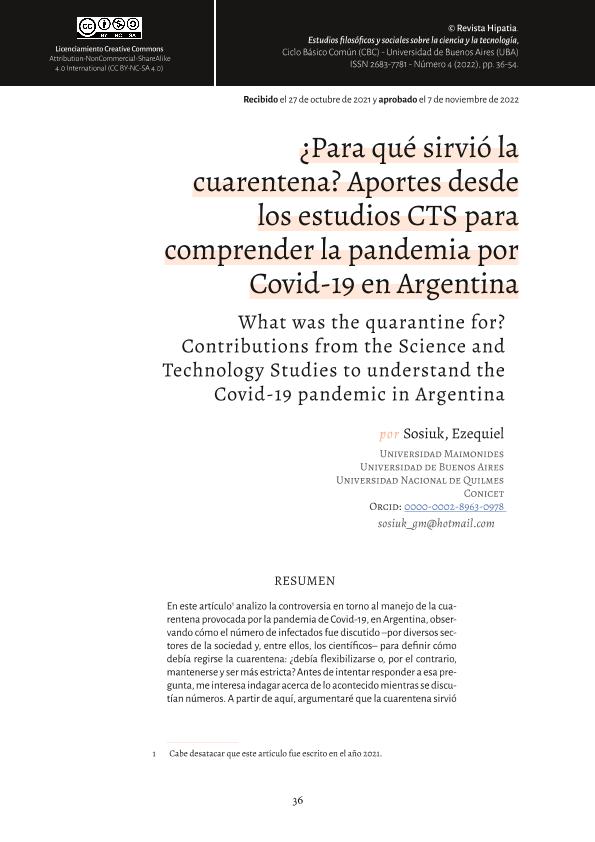Mostrar el registro sencillo del ítem
dc.contributor.author
Sosiuk, Ezequiel Daniel

dc.date.available
2023-12-05T17:43:05Z
dc.date.issued
2023-01
dc.identifier.citation
Sosiuk, Ezequiel Daniel; ¿Para qué sirvió la cuarentena? Aportes desde los estudios CTS para comprender la pandemia por Covid-19 en Argentina; Universidad de Buenos Aires; Hipatia; 4; 1-2023; 36-56
dc.identifier.uri
http://hdl.handle.net/11336/219362
dc.description.abstract
En este artículo, analizó la controversia en torno al manejo de la cuarentena provocada por la pandemia de Covid-19, en Argentina. Observó cómo el número de infectados fue discutido, por diversos sectores de la sociedad, los científicos entre ellos, para definir cómo debía regirse la cuarentena: ¿debía flexibilizarse o, por el contrario, mantenerse y ser más estricta? Antes de intentar responder a esa pregunta, me interesa indagar en qué pasó mientras se discutían los números. Argumentaré que la cuarentena sirvió para acelerar el proceso de digitalización de la vida social, mediante el trabajo a distancia, y para expandir la capacidad estatal para regular y controlar la vida colectiva e individual. Para esto, analizaré los usos de los conocimientos generados mediante la aplicación “Cuidar,” una herramienta digital para definir el estado de salud y regular la circulación individual. Para argumentar los resultados, retomaré aportes de los estudios sociales de la ciencia, en particular los de tradición marxista. En las conclusiones observó la necesidad de ser precavidos frente a los datos científicos que, supuestamente, demuestran la gravedad de problemas públicos.
dc.description.abstract
In this paper, I analyze the controversy surrounding the management of the quarantine caused by the Covid-19 pandemic in Argentina. I observe how the number of infected was discussed by various sectors of society, scientists among them, to define how the quarantine regulations should be governed: should be made more flexible or, on the contrary, maintained and more strict? Before trying to answer that question, I want to inquire what happened while the numbers were being discussed. I will argue that the quarantine served to accelerate the process of social life digitalization through the implementation of remote work, and to expand the state´s capacity to regulate and control collective and individual life. For this, I will analyze the application of the knowledge gathered through the “Cuidar” application, a digital tool to define the citizens state of health and regulate individual circulation. To argue the results, I will take up contributions from the social studies of science, particularly those of the Marxist tradition, which allow us to recognize the scope and limits of scientific data management when demonstrating the seriousness of public problems.
dc.format
application/pdf
dc.language.iso
spa
dc.publisher
Universidad de Buenos Aires

dc.rights
info:eu-repo/semantics/openAccess
dc.rights.uri
https://creativecommons.org/licenses/by-nc-sa/2.5/ar/
dc.subject
CIENCIA
dc.subject
PROBLEMAS PÚBLICOS
dc.subject
COVID-19
dc.subject
EXPERTOS
dc.subject.classification
Tópicos Sociales

dc.subject.classification
Sociología

dc.subject.classification
CIENCIAS SOCIALES

dc.title
¿Para qué sirvió la cuarentena? Aportes desde los estudios CTS para comprender la pandemia por Covid-19 en Argentina
dc.title
What was the quarantine for? Contributions from the Science and Technology Studies to understand the Covid-19 pandemic in Argentina
dc.type
info:eu-repo/semantics/article
dc.type
info:ar-repo/semantics/artículo
dc.type
info:eu-repo/semantics/publishedVersion
dc.date.updated
2023-12-04T11:50:22Z
dc.identifier.eissn
2683-7781
dc.journal.number
4
dc.journal.pagination
36-56
dc.journal.pais
Argentina

dc.journal.ciudad
Ciudad Autónoma de Buenos Aires
dc.description.fil
Fil: Sosiuk, Ezequiel Daniel. Consejo Nacional de Investigaciones Científicas y Técnicas; Argentina. Universidad Nacional Autonoma de Mexico. Cent.de Invest Sobre A. Latina y El Caribe; México
dc.journal.title
Hipatia
dc.relation.alternativeid
info:eu-repo/semantics/altIdentifier/url/https://revistahipatia.com/#!/-edicion-n-4/
Archivos asociados
